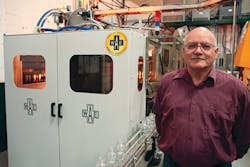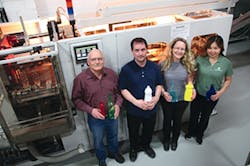
Werner Amsler is known in Canada as an innovator for his work in all-electric blow molding machines and was honored with the 2010 Canadian Plastics Industry Association (CPIA) Plastics Innovator Award, which he identifies as the most significant award that he has received in his career. Given to those whose technological advancements have contributed to the expansion of the Canadian plastics industry, the award recognized Amsler's 2009 "innovative technologies including a fully automatic loading system for wide mouth preforms up to 89mm, a new flexible PET machine series that allows for adjustable cavitations on PET blow machines, and a modular semi-automatic palletizer that provides fully automatic operation through the purchase of additional modules." Amsler constantly uses customer feedback to make improvements to the company's equipment. More recent innovations include options such as preferential heating, hot fill and a neck orientation system that uses standard preforms. The company recently also developed and delivered a customized single-cavity lab machine. When the company was founded, Amsler was the first to introduce a fully electric reheat stretch-blow molding machine. He has a penchant for simplicity, reliability and customer service. Amsler recently spoke with PMM correspondent Lisa Jo Lupo.
How and why did you get into the plastics industry?
Amsler: I was trained as a toolmaker in Switzerland, among other things, and my first job in the plastics industry was in 1970 as a toolmaker in a company which still exists — Plastipak in Richmond Hill. I worked as a toolmaker for a few years, then progressed up to plant manager in the blow molding division. Then I was recruited by a German company, Bekum, back home to head their Canadian service department for the machinery that is sold over here.
In 1980, my brother and I started a company called Swissplas in the molding industry. We made plastic bottles, and ended up with 15 lines when I sold the company to Monarch Plastics in 1988. So that was a successful venture.
Why did you sell this company, then decide to found Amsler?
Amsler: The company was doing very well, so I wanted to take the profits out of it and start a consulting company in the plastics industry. During our consulting phase, the question was always asked by customers, "Where do I find a good reheat stretch-blow molding machine?" There wasn't really anything around other than equipment that wasn't suitable for this market or machines that were really substandard. So in 1994, I decided to start the business we're in now.
We started immediately with fully electric machinery because, even at that time, we were thinking forward to energy conservation and, of course, low maintenance, so hydraulic systems automatically were out of the picture. That's why we did fully electric machines right from the beginning.
It sounds like you were a pioneer from the start. What other innovations did you introduce?
Amsler: We were the first to be fully electric and the first to introduce central cooling systems for the ovens. The fully electric was a big step. We also had significantly fewer parts than anyone else. We just wanted to be simple, reliable, quick — all the qualities that are needed in custom blow molding. We also built the machines for very quick changeover. For the plastic blow molding industry, changeovers of a few minutes would be great, but we wanted to get away from the half-day changeovers everybody else had, and we were very successful with that. Our approach is to make sure we're always ahead of everybody else.
The trend of using all-electric machines for blow molding really only has taken hold over the last year or so. What were you seeing in the industry that made you want to take this step in 1994?
Amsler: I wanted to provide a machine that was energy efficient and simpler to maintain. At the time, hydraulic systems had a bad reputation for wasting energy. Fifty percent of the supplied energy was wasted into heat, which then had to be removed with a chiller. The chiller itself was also inefficient in operation. In addition to the energy lost, the hydraulic systems will leak sooner or later and will thus require a lot of maintenance. Furthermore, the Amsler equipment would be producing bottles for food applications, so oil is not welcome in this environment. There also is an environmental hazard. Hydraulic oil is toxic and needs to be disposed of properly, which is expensive. The Amsler machine design was based on 40 percent less energy consumption and 50 percent less maintenance. [It also allowed for] almost total removal of oil contamination sources on the machinery when compared to hydraulic systems that were available at the time.
Knowing the challenges of entrepreneurship, what have you done to help new and small businesses in the plastics industry?
Amsler: We started a model that we run molds; that is, we let our customers run their molds on our machines in our place. That gets the small guys into the business. When they get started, they have enough money to get into the business and to buy molds which are relatively inexpensive, and they have connections in the industry to sell their bottles, but they don't often have enough funds or knowledge to start their own operation. So we help them get started that way. It works well for us and for many of our present-day customers. We still use the model. It allows us to have a production showroom so our customers can come into our plant and our manufacturing center where we are building the machines, and they can see the machines running production or testing different materials or molds — they get a live demo of the equipment that they are going to purchase. Also, our machines are fully proven before we ship them; they have already run many days of production, not just test runs, which allows for a faster start-up on the other end.
Also, all the parts for our machines are standard off-the-shelf parts, available from any supplier. We don't do custom parts, other than change parts for production, so that way, our customers aren't tied to us for service and parts. They can go to other suppliers that are local to them. The availability of local parts anywhere in the world is really important. And, of course, the parts that are special to our machines we stock here. So we can respond quickly because we have everything in-house.
Why do you believe you succeeded in this business when others have failed?
Amsler: We are the only manufacturer of this type of equipment in North America. We did have competitors, big ones, that finally went by the wayside. We were successful, mainly, I believe, because we don't just have one leg to stand on, we also have the blow-molding division. This is downplayed a lot by us because we don't want to compete with our machinery customers. We don't go out and quote blow molding business, we use the model I discussed earlier — running a blow molding operation with our customers' molds. So that helps with cash flow, and it helps with improving the quality of the machinery.
We also have ancillary equipment. On our bottle-inspection unit, we can test for color; we can, of course, test for leaks; we can test for bottle dimension, wall thickness, metal contamination and correct neck finish. Some people just sell leak detection, but ours is really an inspection unit. We go even further downstream through another division, Amsler Packaging Technology, which focuses on liquid filling, labeling, packaging, all the way to palletizing. So we can provide everything from blow molding to palletizing — and that gives us another leg to stand on, so we have three legs.
When you are not working, what do you do for fun?
Amsler: I have a U.S. pilot's license based on my Canadian pilot's license. That's one of my hobbies — I fly as much as I can, and I ski. I also have a model railroad — called a garden railroad — outside. It's not big enough to sit on — not like the ones at the mall that people ride on; it's 1-to-22 scale; a locomotive might be 3 feet long. The train goes through gardens and railway bridges.
What would you like to see as your industry epitaph? How do you want to be remembered?
Amsler: The motto right now is that Amsler provides quality equipment. I think that's good and I just want to build on that.


